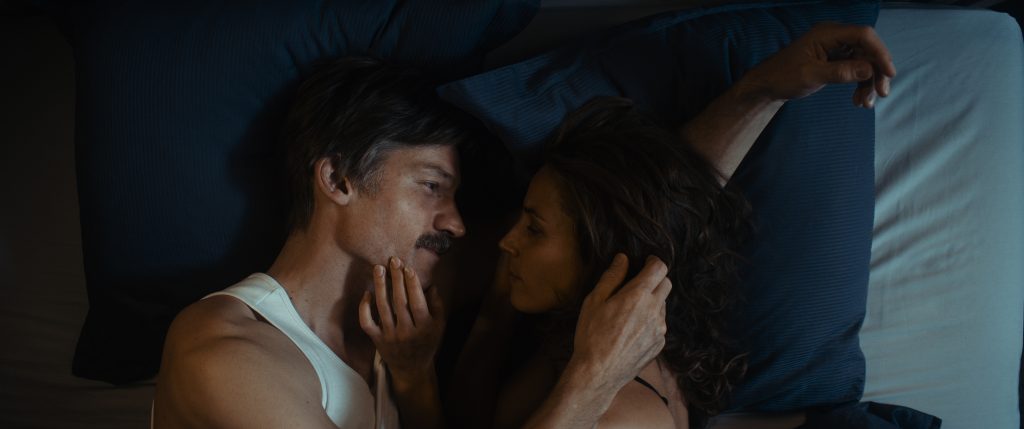June 12, 2020
by Carla Hay

Directed by Jonas Alexander Arnby
Danish and English with subtitles
Culture Representation: Taking place in an unnamed part of Demark, the psychological drama “Exit Plan” has an all-white cast representing the middle-class.
Culture Clash: A man with an inoperable brain tumor has conflicts over his decision to commit suicide.
Culture Audience: “Exit Plan” will appeal primarily to fans “Game of Thrones” alum Nikolaj Coster-Waldau, because there’s not much else that’s appealing about this excruciatingly boring movie.

The concept of the psychological drama “Exit Plan” could have been turned into a riveting film, but the movie is such a muddled, dour mess that by the end of the movie, viewers will feel like they’ve wasted about 90 minutes of their life that they won’t ever get back. Die-hard fans of former “Game of Thrones” star Nikolaj Coster-Waldau might get something out of watching the movie, since he’s in almost every scene. But most people will find it difficult to finish watching the film if they’ve got better things to do.
“Exit Plan” was directed by Jonas Alexander Arnby and written by Rasmus Birch, the duo behind the horror film “When Animals Dream,” which was released in Denmark in 2014 and in the United States in 2015. “When Animals Dream” was also fairly slow-paced, but at least the movie had some suspense and coherent plot. Unfortunately, “Exit Plan” does not have either, and it’s the type of movie that tries to keep people guessing over what’s supposed to be real or a fantasy.
All of that deliberate confusion for no real purpose just means that the screenwriting is lazy and unimaginative. In “Exit Plan,” which is told in a nonlinear way with flashbacks or illusions, Coster-Waldau portrays a life insurance agent named Max Isaksen, who finds out that his brain tumor has grown and is inoperable.
Max lives with his girlfriend Lærke (played by Tuva Novotny), and they have a loving relationship, but not open enough where Max tells her the bad news that his brain tumor has gotten worse. The movie keeps viewers wondering if or when Max will tell Lærke this bad news. One thing that is clear though is that Max has decided to commit suicide.
His initial attempts to kill himself end when he changes his mind. First, he tries to hang himself. Then, he tries to drown himself. Both times that he stopped himself from the suicide were very close calls, since he nearly suffocated and drowned.
Viewers find out in a flashback scene that one of Max’s clients is a distressed woman named Alice Dinesen (played by Sonja Richter), whose husband Arthur Dinesen (played by Anders Mossling, seen in flashback scenes) has disappeared. Alice is convinced that Arthur is dead, while Max tells her that she can’t collect on Arthur’s life insurance policy until there is proof that Arthur is deceased.
In another flashback scene, Alice has another appointment with Max, and this time she says that she has proof that Arthur is dead. Alice then shows Max a video of Arthur naming the date that he supposedly made the video and reading from a statement that he is of sound mind and wants to commit assisted suicide. Arthur also says that watching the video means that he is already dead. That’s not really proof that he’s dead (where’s the body?), but the movie wants viewers to overlook this silly plot hole.
It’s through this “farewell message” video that Max finds out about the remote and mysterious Hotel Aurora, whose specialty is euthanasia. All of the hotel’s guests have voluntarily checked in so that the hotel’s staff can assist in the guests’ suicides. And once the date for a guest’s suicide is chosen and papers are signed, the guests cannot change their minds.
It’s not too surprising that Max checks into the hotel. At the very beginning of “Exit Plan,” he’s seen giving his videotaped statement and saying at the end, “When you see this, I will be dead.” A no-nonsense hotel employee named woman named Karen (played by Sobjørg Højfeldt) acts as an administrator/guide to the hotel’s activities and regulations.
The rest of the film is a dull stretch of Max at the hotel (where the euthanasia people wear striped pajamas), essentially waiting to die. He makes a friendly acquaintance with a young man named Ari (played by Robert Aramayo), whose reason for wanting to committing suicide is not revealed in the film.
After Ari introduces himself to Max in a hotel dining room area, Ari says, “What are we supposed to talk about around here?” Max replies, “Maybe not the future.” That’s the only sliver of humor in this dark and somber film.
Max also does things such as participating in group mediation classes with fellow guests and choosing the urn that will contain his ashes. And when he looks in the bathroom mirror, he sees a mysterious message that says, “You will get out.” And he sees something disturbing that makes it clear that this hotel is more like a prison.
The only time that “Exit Plan” shows signs of taking the story in a more interesting direction is when a hotel employee tells Max that at the hotel, “There are no taboos here.” That leads to Max having some drug-induced hallucinations that don’t really serve much purpose except to waste more time.
During one of these scenes, he goes to the hotel bar and meets a woman who’s been paid by the hotel to portray a mother figure for the guests, in case they want to get some mommy issues out of their system before they die. There are other “paid actors” at the hotel bar who are there to also play roles for the guests.
“Exit Plan” would have been a much better film if it had continued with this idea and showed what people would want to do at a hotel to fulfill their fantasies before they die. Instead of just Max, at least two other guests’ personal histories should have been explained, so viewers could know why other people ended up at the hotel.
Instead, the movie focuses only on Max, and there’s not much that can be said about his personality or backstory, because his character has too much vagueness. If Max and Lærke have any family members and friends, they’re not seen or mentioned at all. The closest thing to family that Max and Lærke seem to have is their pet cat.
“Exit Plan” was edited by Yorgos Mavropsaridis, who’s previously edited the Yorgos Lanthimos films “The Favourite” and “The Lobster,” two weirdly wonderful movies where the editing made a big difference in making the stories engaging. So with Mavropsaridis showing great editing talent before, he must have had his work cut out for him in editing “Exit Plan,” which is at times incoherent and has scenes that don’t really go anywhere.
The cinematography of Merete Bostrøm beautifully captures the outdoor scenery of “Exit Plan,” which is supposed to take place in Denmark but was actually filmed in Norway, Sweden and Germany. The movie’s interior scenes are dark and depressing, which is appropriate for a film about a suicidal person’s experience in a euthanasia hotel.
But the morose atmosphere drags the film down even more when the movie is already boring and aimless. Max wants to be put out of his misery. Viewers of “Exit Plan” will feel another kind of misery from watching this film.
Screen Media Films released “Exit Plan” in select U.S. cinemas and on VOD on June 12, 2020.
